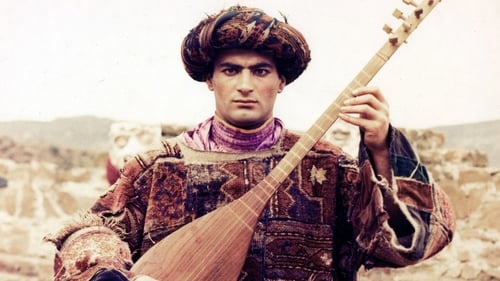
Writer
Wandering minstrel Ashik Kerib falls in love with a rich merchant's daughter, but is spurned by her father and forced to roam the world for a thousand and one nights. Now presumed dead by those he loves, he performs for the poor and unfortunate on his journeys through the wilderness. Parajanov's visually ravishing 'tableaux vivants' tell Lermontov's romantic tale while Turkish and Azerbaijani folk songs transport us into its mystical landscapes.

Alik Lolishvili, who lives in old Tiflis, is a very interesting person, he is fond of all kinds of technical innovations and is a tireless fighter for technological progress. He is introduced by Albert Lolisch and advertises bicycles in the city, and then, together with the daughter of the local city rich man Betty Zandukeli, opens an office for the rental of this new car. At first, residents think that Albert Lolish is a rich and successful French businessman who came to provincial Georgia, as well as Betty's lover, who is fascinated by such a dandy. But the bike business is failing, and residents realize that Albert is a real adventurer.

Screenplay

милиционер
Detective Kostenko is traveling between Moscow and Sukhumi trying to find the responsible for double homicide.

Archil
Sophiko, a well-known journalist, seems to be more close to many of her respondents when they need her advice than to his family members. All engrossed in her work, she suddenly finds out that she is losing her husband who has started a love affair with another woman. Of course, it strikes her badly but life never lets her to concentrate on her personal problems.

Script Supervisor
A short story about three cheerful road workers who help a beautiful girl catch butterflies.

Writer

Screenplay
This short film captures the beauty of a process that has persisted since the Stone Age. Sharing one of the recurrent stylistic motifs of the Georgian documentaries shown here, an uncanny atmosphere is created by the use of post-production sound and chiaroscuro lighting. In effect, the removal of the bread from the oven is witnessed with the same sense of wonder as would greet the appearance of a flying saucer. When sticking the dough to the tandoor, the baker moves half of his body into this dungeon – an image at once frightening and mesmerising. Nowhere else has bread been seen like this, save perhaps for Night of the Living Bread (Kevin S. O’Brien, 1990). But this is hardly a parody: here the most essential human foodstuff meets an expressionist sensibility. In fact, along with Manoel de Oliveira’s O Pão (also showing this year), Khabazebi presents some of the most beautiful images of our daily bread on screen.





